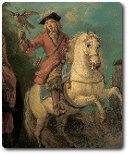The Taming of the Shrew Contents
Hawking and falconry
A prestigious pastime
 During the sixteenth century, hawking and hunting were luxury sports associated with nobility and chivalry. Falconry in particular was an expensive, privileged sport and an indicator of prestige and nobility. Petruchio’s methods of ‘taming’ Katherina are similar to those employed by a falconer as he tamed his bird of prey. Throughout The Taming of the Shrew Shakespeare refers to falconry and the process of taming a hawk or falcon.
During the sixteenth century, hawking and hunting were luxury sports associated with nobility and chivalry. Falconry in particular was an expensive, privileged sport and an indicator of prestige and nobility. Petruchio’s methods of ‘taming’ Katherina are similar to those employed by a falconer as he tamed his bird of prey. Throughout The Taming of the Shrew Shakespeare refers to falconry and the process of taming a hawk or falcon. Hawking technique
Petruchio declares that he has ‘a way to man my haggard’ and in so doing compares Katherina to an untrained hawk. He outlines his plan to tame Katherina and describes the process that would be familiar to any falconer:
Thus have I politicly begun my reign,
And 'tis my hope to end successfully. My falcon now is sharp and passing empty; And till she stoop she must not be full-gorged, For then she never looks upon her lure. Another way I have to man my haggard, To make her come and know her keeper's call, That is, to watch her, as we watch these kites That bate and beat and will not be obedient. She eat not meat to-day, nor none shall eat: Last night she slept not, nor to-night she shall not; … … Ay, and amid this hurly I intend That all is done in reverend care of her: (Act 4 Scene 1)
And 'tis my hope to end successfully. My falcon now is sharp and passing empty; And till she stoop she must not be full-gorged, For then she never looks upon her lure. Another way I have to man my haggard, To make her come and know her keeper's call, That is, to watch her, as we watch these kites That bate and beat and will not be obedient. She eat not meat to-day, nor none shall eat: Last night she slept not, nor to-night she shall not; … … Ay, and amid this hurly I intend That all is done in reverend care of her: (Act 4 Scene 1)
‘Falcon’, ‘sharp-set’, ‘stoop’, ‘full-gorged’, ‘lure’, ‘haggard’, ‘watch’, ‘man’, and ‘bate’ were all technical terms used in falconry. The methods of taming a falcon included depriving the bird of food to the point of starvation and of sleep to the point to exhaustion until the bird’s behaviour changed from extreme wildness to extreme obedience. Throughout this process the falconer underwent the same extreme deprivation, being forced to watch the falcon ceaselessly and care for any injuries the bird sustained in the process.
The careful regulation of the hawk’s appetites, such as for food and sleep, and the method of ‘sealing’ its eyes so that it is blind for a time are part of the process of making it totally dependent on the falconer and therefore totally obedient. Once it is obedient, the falconer can trust the hawk to hunt out in the field without flying away. Careful training can turn a wild and dangerous bird, a ‘haggard’, into an obedient hunting bird who returns to the falconer and learns to follow the lure that will guide it back to his hand.